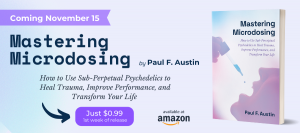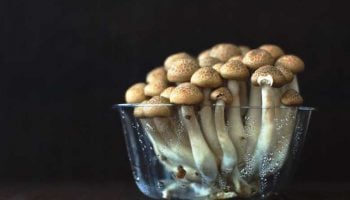Inspiration Behind Mastering Microdosing
American writer and psychedelics researcher, James Fadiman Ph.D., ushered microdosing into the mainstream upon releasing The Psychedelic Explorer’s Guide in 2011. Soon after, Silicon Valley’s high-powered innovators adopted the practice, taking small amounts of LSD and psilocybin to perform better and solve complex problems. But consuming sub-hallucinogenic psychedelic doses is far from an elite protocol. Growing research shows that everyone from biohackers to soccer moms could benefit from Mastering Microdosing to heal trauma, improve productivity, and transform their lives.
In 2015, Third Wave Founder Paul Austin was one of the first psychedelics leaders to adopt a regular microdosing protocol. Paul’s tiny dose regime helped him reframe self-limiting stories that fed his fear of social interactions, reject the relentless internal boss that kept him buried in busy work, and silence the nagging voice that fostered self-rejection. He began engaging more deeply with others and better aligned his values and actions. Along his journey, Paul has helped millions of people harness microdosing as a skill through various Third Wave courses, workshops, and podcasts.
Now Paul’s ready to share his microdosing story and lessons with the world.
In this passage from Paul’s book, Mastering Microdosing: How to Use Sub-Perceptual Psychedelics to Heal Trauma, Improve Performance, and Transform Your Life, he shares how microdosing revealed hidden vulnerabilities and transformed them into personal strengths. Paul also shares Janet Chang’s story and path to finding her perfect “minidose.”
Mastering Microdosing is available for only 99 cents the first week after the launch, starting November 15th. Order your Mastering Microdosing copy today.
Deeper Sense of Connection: {Paul Austin’s Microdosing Story}
Like so many others, what I gained [from microdosing] was far more useful and transformative than expected. Yes, I saw an end to my social anxiety and insecurities, but I also developed more empathy and compassion, experienced deeper engagement in my relationships, and was able to cultivate a sense of presence that I’d rarely felt before.
Even better, microdosing also shed light on points of vulnerability that I didn’t even know were there.
Microdosing helped me become aware of the source of my social anxiety. I’ve always been an introvert who needs time to recharge between social engagements. Like many, I’d tried to tame that social anxiety with alcohol, which was more detrimental than helpful. Microdosing helped me foster prosocial qualities by stripping away the pretense from my interactions that would typically leave me drained; it brought ease and depth to my communications.
Microdosing also helped me understand who I am as a person. I was able to accept my naturally introverted side and reframe it as something to leverage rather than repress. I stopped being so hard on myself when I realized I needed to recharge. I developed the confidence and patience to prioritize rest so I could show up with more presence when with others. I was able to step out of the story that I was “socially awkward” and allowed myself to show up as my free and authentic self. Once I’d done this, I realized that so many of us are suffering from the fear of being rejected for who we truly are. But for humans, community means survival, and our disconnection from that is detrimental.
This microdosing-induced self-reflection also unearthed some of the unpleasant driving forces behind my desire for increased productivity. When engaging with psychedelics, there tends to be a “deconditioning of the shoulds” and a deeper desire to ask ourselves what we truly want. I examined why I was so driven to perform in the first place. I reevaluated my relationship with work and how my focus on performance was rooted in covering up some deep-seated anxiety about inadequacy. This enabled me to tune in internally and come to some realizations about my true desires, not the “shoulds” that peers, parents, and the broader culture externally impose.
This reevaluation didn’t stop me from working. It simply helped me pinpoint a direction that felt authentic for my life. My professional path and my personal mission became inextricably linked with microdosing. The practice helped me understand which projects felt truly aligned with my truth.
When I was building [the Test of English as a Foreign Language (TOEFL), I knew I loved education, teaching, and building curriculums, but I also knew I wouldn’t teach English for the rest of my life. Instead, I saw it as a stepping stone to something greater: Third Wave. Thanks to a much-improved ability to handle complex tasks and integrate new information, after I grew my online English teaching business, I was able to officially bring Third Wave to the world.
Not long after that, I co-founded a third business, called Synthesis, a legal, medically supervised psilocybin retreat located in the Netherlands where psilocybin truffles have been legal for years.
Our goal with Synthesis was to weave together ancient modalities with contemporary practices such as coaching, psychotherapy, and music therapy. Synthesis eventually became the gold standard for legal psilocybin retreats globally.
Through Synthesis, I understood how working in person with clients motivated me. During the eight retreats I led at Synthesis in 2018, I learned that I wanted to make human connection a central part of my professional work. I have loved many other aspects of my work: creating courses, doing podcast interviews, thinking about scalable products, and more, but nothing resonates with me on a soul level like human connection.
Since those experiences in 2018, I have continued to move in the direction of human-to-human connection. I credit microdosing not only for helping me understand my core values but also for helping me to stay true to them in my business ventures.
Mood Boost: {Janet’s Microdosing Dosage Protocol}
Like me, many of Third Wave’s podcast guests found that [microdosing] benefits exceeded their expectations. For example, entrepreneur Janet Chang said she found her productivity to be measurably improved in specific areas, like sales and outreach. However, she experienced vast improvements in several other areas as well, including emotional self-awareness, mood, creativity, and sociability.
Janet’s story is a compelling one, and not just because she did such an exemplary job of self-tracking throughout her yearlong experiment with microdosing psilocybin.
Careful to guard against the placebo effect by avoiding others’ accounts of their experiences, she tried to be as objective as possible, experimenting with various dosage levels and keeping detailed reports on several key data points. These included the quantity and nature of her thoughts, creativity, and sociability.
She also used rankings between 1 and 5 to rate her anxiety, mood, and productivity levels and categorized the numbers as follows:
- Extremely low
- Slightly lower than normal
- Normal (baseline)
- Slightly higher than normal
- Extremely high
At 0.15 to 0.2 grams of psilocybin mushrooms (Fadiman’s suggested microdose) she experienced mild improvements to her mood and anxiety levels (rated 3.25 and 2.13, respectively) but not to her productivity (which idled at 2.75).
The following dosage level was 0.2 to 0.4 g, and she had the opportunity to test between two different work environments: one less orderly and more social, and the other more organized and mostly independent. In the former environment, she found she was extremely productive (4.71) but also highly anxious (3.43).
In the latter, she was somewhat less anxious (3.17) but also less focused (2.61). Her mood was generally exaggerated, characterized by higher highs and lower lows.
Finally, at 0.5 g, typically described as a “minidose” or “creative dose,” Janet was surprised to find her anxiety levels almost negligible at 1.41. (As a sidenote, a “minidose” is a slightly perceptible amount of psychedelic that still allows for normal day-to-day functioning.) Her mood and productivity levels significantly improved at 4.50 and 4.07, respectively.
What Readers Can Expect from Mastering Microdosing
Mastering Microdosing is an all-inclusive guide to the practice of microdosing, including protocols, benefits, potential drawbacks, and sourcing. In the most comprehensive book of its kind, Paul F. Austin weaves together research and anecdotes to show the positive impact of psychedelics on general well-being, particularly in the daily lives of leaders, creatives, and healers.
Readers will learn why microdosing has become so popular, the steps to dialing in their weekly protocol, and how to obtain psychedelics. Psychedelics are largely illegal, but readers will be surprised to learn that legal psychedelic alternatives are available. Additionally, readers will discover how to utilize above-ground networks or grow their psychedelics at home.
Whether you’re interested in learning more about this developing topic or simply refining and mastering your personal psychedelics use, Mastering Microdosing is a must-have resource for profound and transformative change.
You can get your copy for 99 cents the first week after the launch, starting November 15th.
Once you’re finished, please leave an honest review on Amazon. We’d love to hear from you!








